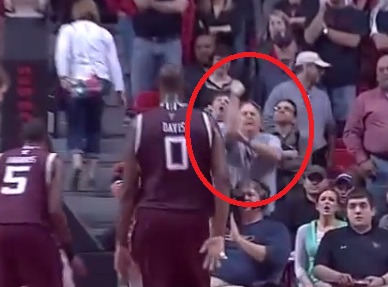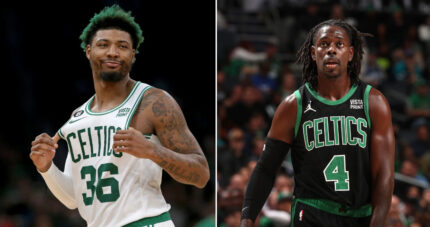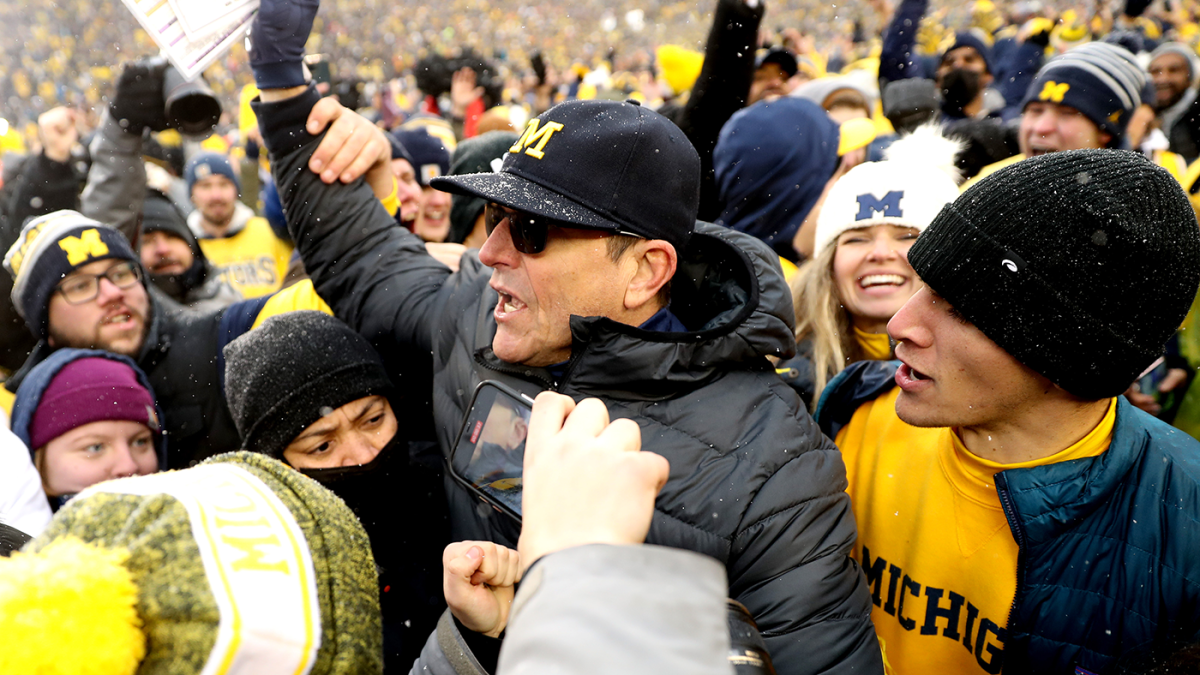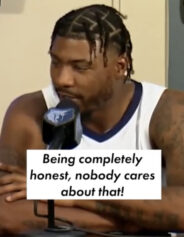On Thursday, I used Marcus Smart’s trying sophomore season as a tale of caution for Joel Embiid or any freshman phenoms with top-10 draft stock considering the idea of returning for their sophomore seasons. The year began with promise after his 39-point outburst against Memphis. It's gone downhill quicker than the Jamaican bobsled team since then. Smart’s struggles this season finally reached a boiling point with six seconds remaining in Oklahoma State’s 61-65 loss to Texas Tech. After tumbling into the stands like a wrecking ball while attempting a chasedown block of Red Raiders forward Jaye Crockett, Smart responded to comments made by a fan behind him, identified as Jeff Orr, leapt to his feet and shoved Orr and was pulled away by teammates before things could further escalate.
Sure this has been said but OSU radio said immediately after the incident that Smart told the OSU coaches that the fan said THE word
— Ryan Aber (@ryaber) February 9, 2014
Allegedly, Smart told coaches that Orr set him off by letting the N-word slip off his tongue. Other reports claim that Orr didn’t yell out the N-word or any other vulgarities, but an unfounded rumor has circulated claiming that he told Smart to “Go back to Africa.” The rage that filled Smart after the death of his two brothers before he was 12 to cocaine and cancer in connection with his rough Dallas upbringing came bursting through at that moment and clouded the mature judgment he'd displayed for much of his hoops career.
Whatever was said to Smart, all Texas Tech can do is ban a fan from their arena. He’s one of thousands. Someone else will take his seat and Texas Tech’s home crowd won’t skip a beat. Marcus Smart has to have more self-control. Orr has been profiled on Texas Tech’s YouTube channel as their No. 1 fan, so he shouldn’t escape unscathed. Orr should be banished from Tech’s arena, but fans don’t score points or win games. Smart returned for the purpose of improving upon Oklahoma State's second round NCAA Tournament elimination. If the NCAA drops the hammer, all that may go down the drain.
If this fan (Jeff Orr) said something racist to Smart he should never be allowed into the arena again. Let's wait til facts come out.
— Seth Davis (@SethDavisHoops) February 9, 2014
There’s only one Smart in college hoops and because of his impulsive reaction to an overzealous fan, the Oklahoma State guard was suspended for three games on Saturday. At least it's not a suspension that will greatly affect the Cowboys' NCAA Tournament aspirations. The NCAA obviously took into account what derogatory comments Smart heard to provoke him and recognized that he didn't sprint into the stands chasing the ghost of Ron Artest. He landed there diving to make a play on the ball.
We are so deep into uncharted waters that officials could only assess a technical to Smart, who should have been ejected. However, Big 12 officials don't have the authority to eject players for interacting with fans. After the game, Big 12 officials and Smart's university did have the power to collectively decide on a suspension they felt was appropriate, but their hands were tied during the contest.
"There is no precedent for that," Big 12 coordinator of officials Curtis Shaw told ESPN. "Our rules are for flagrant 1 or 2. We don't have grounds for dealing with a fan. We don't have a rule to get involved when the player is involved with a fan. We don't know what was said. The official, Doug Sirmons, didn't know what was said."
Smart doesn’t have to accept the level of abuse Texas Western’s all-black starting five endured en route to the 1966 national championship, but flying off the handle isn’t acceptable. This isn’t an isolated incident for Orr or Smart. Smart’s developing a reputation as a bit of a hot head on the court in recent weeks and his Q Score is going deep sea diving.
Oklahoma State head coach Travis Ford defended Smart's character on Saturday and characterized the entire incident as unfortunate, but not character revealing.
"I think theres a lot of lessons to learn from things in this situation on both sides, no question. No question," Ford said during a press conference announcing Smart's suspension. "Fans nowadays are closer to the court than they've ever been before. We arent going to put blame on anybody. We know Marcus made a mistake and hes very regretful about it and there's no question there's alot to be learned from this. He's done alot of good as a teammate trying to uplift them even when times are difficult. My (concern) is all of that will get lost in all of this."
Orr isn’t just a superfan, he’s an oafish buffoon. In 2010, Orr was seen giving Texas A&M’s Bryan Davis an F-U sign after his dunk to end the half.

Smart will still be a lottery pick, despite his inability to connect from beyond 20 feet, however, NBA teams will have questions about Smart’s temperament, especially after he stomped on a bench chair in the second half of a win over West Virginia when he scored a career-low four-points. Between Orr and the chair, the chair got the worst of it.
Smart looks like a man who's been burned out this season and Saturday night's meltdown was an indicator of emotionally fatigued he's become. Unfortunately, Oklahoma State coach Travis Ford made Smart unavailable for comment after the game. That's too bad. Clarification on what occurred Saturday night is badly needed because there is a broader issue at hand. Fans tiptoeing the line of decency is nothing new.
However, just as officials have become less tolerant of on-court behavior, how much is too much for players? If instant replay can be used to assess whether a foul is flagrant or not, as it has numerous times this season during Smart's Oscar-worthy flopping displays, it can it be used to determine whether specific fans can be ejected?
Howard Wasserman, a law professor at Florida International University as well as an expert on fan behavior and the First Amendment for at least a decade doesn't believe it is possible to apply strict standards to fan behavior in a publicly-financed arena.
“It isn’t yelling or screaming; that is part of the game,” Wasserman told the New York Times in 2012. “For better or worse, you’re allowed to go to a sporting event and express yourself just as you’re allowed to go to a political rally and say what you want.
“When you go to a game, the governing body can control drunken behavior. It can control someone standing up and blocking the view of others. It can control signage if it blocks the view of others. But most views expressed, even loud ones, are protected speech. No one has the right to insist that the game be watched in silence.”
Besides, it's much easier watching 10 players and two benches than it is monitoring 20,000 fans.
The NCAA's national coordinator of men's basketball officiating also told the Times that officials listen for taboo racial or sexually-oriented words from belligerent fans.
However, that seems to only apply to fans accosting student athletes. Apparently, the standard for expulsion is lower for the NCAA's non-proletarian class. During the second half of an NC State home game against Florida State on February 18 2012, officials requested the ejection of former NC State alumni Tom Gugliotta and Chris Corchiani for criticizing their calls behind the scorer's table. There were no reports of vulgarities being used. Using that standard, this Maryland-Duke eight years ago, should have been halted for the entire Maryland student section to be removed after they coordinated a malicious "F–k You JJ" chant.
That's a can of worms the NCAA or its member universities don't want peeled open. These fans symbolize the intense passion associated with college athletics. The NCAA's not going to risk messing with their own steez.
Two years ago, members of the Southern Mississippi band chanted "Where's your green card" every time Kansas State point guard Angel Rodrigez, who is a Puerto Rican U.S. citizen went to the free throw line. This is nothing new either. None is as vile as what happened to Steve Kerr 30 years ago during his freshman season at Arizona. Days earlier, his father Malcolm, president of Beirut's American University, was assassinated by terrorists. A few days later, Arizona State students shouted PLO! PLO!, an acronym for the Palestinian Liberation Front and "Where's your dad?" during the pregame.
On the other hand, free speech laws don't stop officials from using their influence to remove fans that make them the target of taunts. For the most part, student-athletes are asked to handle themselves with the aplomb of seasoned politicians facing hecklers.
Politicians and athletes can't go slinging mud at everyday citizens because they have much more to lose. If you've spotted the spectacle behind Lee Corso, Chris Fowler, Desmond Howard and Kirk Herbstreit on their weekly College Football Gameday show, it'll become apparent that fans relish the 15 minutes of fame at any cost. It's up to the NCAA and institutions hosting these events to protect the physical and mental well-being of its student-athletes. If they don't show the slightest allegiance to Smart and others like him how can we blame athletes who lash out?
Sometimes enough is enough. We can't ignore Smart's side after the discussion in recent months about the mental health of athletes from Jonathan Martin to Mike Rice's tyrannical rule over Rutgers basketball. On Saturday, Mario Balotelli finally broke down under the duress of racial abuse from Italian football fans.
If the NCAA wants to curtail the growing dissidence from student-athletes from spreading outside Northwestern, this is a good place to start.
Not only should we be watching how the NCAA disciplines Smart, but what Texas Tech does with Orr's access to attending Texas Tech home games in the future deserves equal scrutiny.



